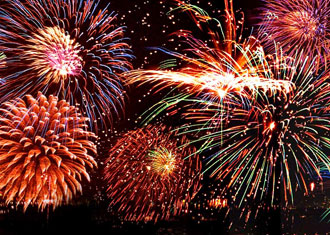Few Americans watching and setting off July 4th fireworks were thinking about the origin of this activity in 12th-century China or even the probable physical origin of the fireworks themselves in factories in China which still leads the world in fireworks production.
Not many Americans know that the Yankees, the championship team of our national sport, bears a name that is not only a synonym for “Americans” but is of Chinese coinage. Or that the ketchup and mustard we squirt on our hamburgers and hot dogs originated in China. We have a vague inkling that the clothes we wear, the pen we write with, the tires on our cars, the tennis racket and volleyball we play with, the swimming pool pump, the refrigerator that holds our food are most likely made in China. Few of us consider that much of the money financing our stimulus programs was borrowed from frugal Chinese families.
My point isn’t that Americans are negligent about China’s role in American culture. It is that China’s contributions are woven into the very fabric of our culture and way of life to an extent difficult for even the most learned American to extricate. And if we could somehow separate and discard all such contributions, we wouldn’t be the society we are today. We would certainly be much poorer in every way. And to some probably lesser extent similar observations can be made about the contributions made to American life by India, Japan, Korea and other nations around the world.
The independence at the heart of our July 4th celebration is a construct based narrowly on our political independence from England, an historical event that marked a symbolic national birth. No thinking person could interpret it as a celebration of our literal independence from the world outside our borders.
Unfortunately, some Americans like to interpret July 4th as an assertion of our nation’s ability to “go it alone” and even prosper by excluding the rest of the world from our borders and from our dreams of a better future. This mentality is especially dangerous at a time when we are battling planet-scale forces like climate change, muslim fundamentalist terrorism, international druglords — none of which we can tackle successfully without the world’s support.
So I think the United States of America can benefit from injecting some perspective into each of our July 4th celebrations. Young people and nations naturally take pride in their “independence”, but mature people and nations take heart in a recognition of our great interdependence with the world around us. As we begin our 235th year as a nation, I propose that the United States take the lead again. Let’s set an example for the rest of the world by expanding our 4th of July holiday to a time to celebrate the maturing of our nation into one that recognizes and celebrates its interdependence with the rest of our planet.

